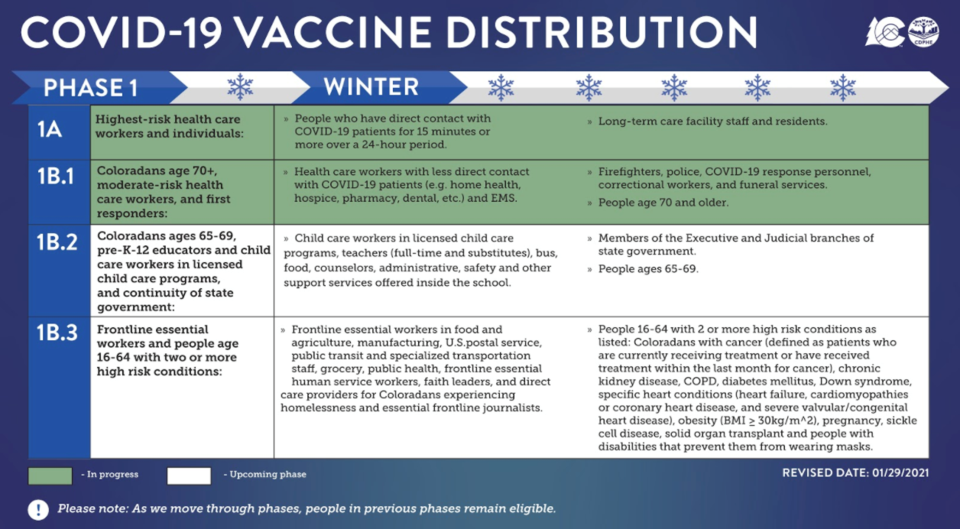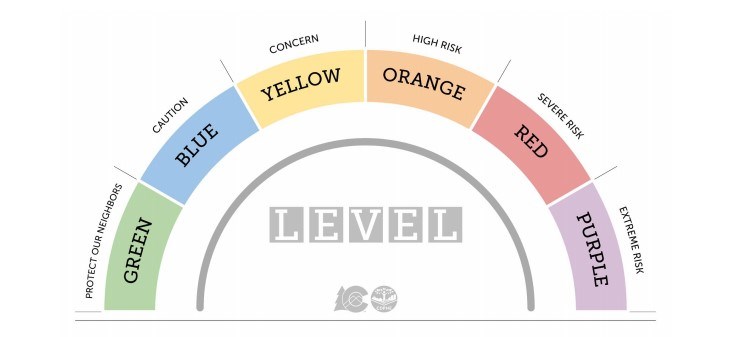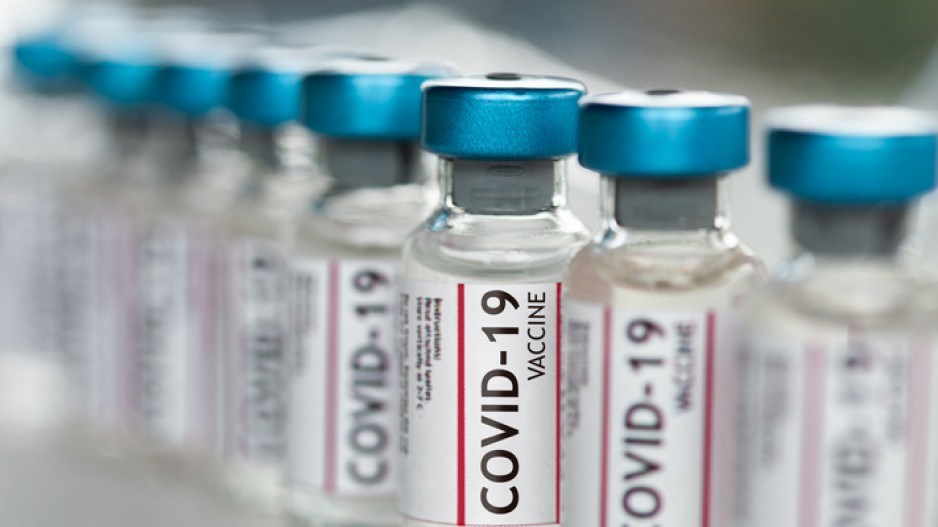Boulder County Public Health is turning its focus toward education in an effort to reach minority populations that might be hesitant to receive the COVID-19 vaccine.
This week, the state moved into Phase 1B.2 in its vaccination plan, which made an additional 17,400 people in Boulder County eligible. The phase allows residents 65 and older, K-12 educators, licensed child care providers and people who “ensure the continuity of the government” to receive the vaccine.
Phases 1A and 1B.1 remain open and the county is still working to get vaccines to people in those priority groups, including adults 70 and older. The county has successfully vaccinated around 60% of people 70 and older, Chris Campbell, BCPH emergency manager, said Wednesday during the county’s weekly COVID Community Update.
 The state's new COVID vaccine priority plan shared by Gov. Jared Polis' office on Friday, Jan. 29, 2021. Courtesy photo
The state's new COVID vaccine priority plan shared by Gov. Jared Polis' office on Friday, Jan. 29, 2021. Courtesy photoThe dial was revamped last week to consider case numbers on a seven-day basis instead of 14 days. To be at the yellow level on the new dial, counties’ case totals must be between 100 and 300 per 100,000 population over a seven-day period with a positivity rate of less than 7.5%.
 The state's COVID dial dashboard. Source: Colorado Department of Public Health and Environment
The state's COVID dial dashboard. Source: Colorado Department of Public Health and EnvironmentAs of Wednesday afternoon, 17,860 county residents had tested positive or were considered probable for the virus with 497 people hospitalized, and 236 people had died with COVID, according to BCPH data. Case numbers and hospitalizations were not updated Wednesday, however, because of issues with the Colorado Department of Public Health and Environment databases, according to the county health department.
COVID data
For information on Boulder County COVID cases, deaths, hospitalizations and trends, click here.
As the numbers trend in the right direction, Jeff Zayach, executive director of BCPH, said transmission control is vital to preventing another surge and avoiding more hospitalizations and filling intensive care unit beds.
“Masks, until the vaccines are widely available in our community are going to make a big difference in helping control the disease and keep our transmission control high in Colorado,” he said.
Also key to progress is reaching underserved minority populations.
One of the biggest challenges the county has identified is a lack of information to those communities to allow them to feel comfortable receiving the vaccine, Campbell said.
The county recognizes that “racial and ethnic minorities in the community, definitely, have seen barriers, historic barriers. Community members who have been impacted by systemic injustice are a challenge as well. We are very cognizant of that and want to continue to work with community members on this to ensure equitable access to vaccines in Boulder County,” Campbell said.
Education efforts are underway to build trust in the vaccine, as “vaccine hesitancy will impact our equity goals,” Campbell said.
The Colorado Department of Public Health and Environment in a survey conducted in September found that of 811 people who responded, African Americans and Hispanics had the least trust in the vaccine.
Boulder County is partnering with CDPHE as it begins a campaign to provide vaccine information in “many languages,” Campbell said.
“We need to reach people where they are and have a conversation about what their issues are regarding vaccine hesitancy,” said Dr. Chris Urbina, Boulder County’s chief medical officer.
The county is working to launch community and mobile clinics that will utilize schools, churches and other trusted facilities to bring the vaccine to more people, Campbell said.
A statewide vaccination equity task force created last year also is working to reach Black and Latino communities, which have been disproportionately impacted by COVID, according to Immunize Colorado.
The task force “ whose members represent communities of color, in addition to a variety of experience and expertise (e.g. advocacy, policy-making, business, faith-based leadership, public health, healthcare and infectious disease research), will prioritize strategies for equitable immunization delivery, access and education, and implement efforts to reduce barriers to and misinformation about vaccines, according to Immunize Colorado.
Black people make up 4.6% of Colorado’s population but make up 14% of people hospitalized statewide, according to a vaccine equity fact sheet created by Immunize Colorado. Similarly, Hispanic people who comprise 22% of the state’s population account for 38% of hospitalizations, according to the fact sheet.


